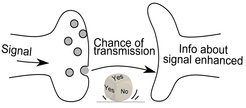Cortical circuits: the noisier, the better
Plausible explanation for the unreliable synaptic transmission found

Unreliable synapses (image by Tatjana Tchumatchenko)
The transmission of information between cortical neurons is remarkably unreliable. About half of the couplings (synapses) do not respond to the spikes at all and if they do the signal varies in amplitude. Tatjana Tchumatchenko of the Max Planck Institute for Brain Research in Frankfurt collaborated with colleagues at the University of Tübingen and Houston to discover a new mechanism that may explain why these unreliable conditions do not harm the reliability of cortical computations. The novel mechanism was presented in the latest issue of Physical Review E.
The researchers modeled information transmission in cortex, which is known to exhibit a tight balance between neural excitation and inhibition. They found that this balance is key to a surprising effect: synaptic noise improves rapid communication between pre- and post-synaptic neurons. With this finding the researchers offer a plausible explanation to an old question in neuroscience: how can the brain perform reliable computations if signal transmission between neurons is so unreliable? While man-made digital computers are highly optimized to avoid any possible sources of noise, the fundamentally different nature of cortical computation might intrinsically benefit from noisy communication. A unique feature of the new mechanism found by the researchers is that it does not rely on any fine-tuning but it simply holds: the noisier, the better.










